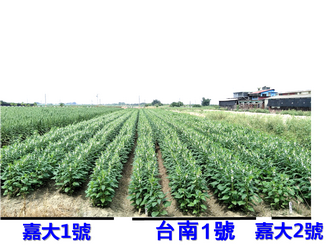| |
 |
News |
 |
Browsing: 3828
times

|
Date:2017-11-21
Bracket:2017 NCYU News
Department:ncyu
|
 NCYU Develops a New Sesame Species to Replace the Imported Sesame
NCYU Develops a New Sesame Species to Replace the Imported Sesame
Sesame (Sesamum indicum L.) is beneficial to human health because it boasts high contents of antioxidant such as lignans, and proves to inhibit free radicals. The yields of domestic sesame, however, have failed to meet the local needs in Taiwan. Prof. Liu Jing-Ping and Assistant Prof. Yu-Chia Hsu from the Department of Agronomy, National Chiayi University, have thus been dedicated to studying new species of sesame for six years, and the two new species were named “NCYU No.1” and “NCYU No.2” after review on Nov. 14th. Both the new species boast high yields, high contents of lignans, lodging resistance and other characteristics. They planned to submit an application for a non-exclusive authorization, which is expected to offer new options for farmers to choose from in the next year. If the planting area can increase year by year, the domestically produced sesame is hoped to replace the imported one on a gradually basis.
According to Prof. Liu, NCYU No.1 and NCYU No.2 are the first two new species of sesame bred by the Department of Agronomy since its founding. The grain yields of NCYU No.1, which shows a lignan content of 135 mg/100g, can reach nearly 2,076 kg/acre in the spring, and about 1,124 kg/acre in the fall. The grain yields of NCYU No.2, which obtains a lignan content of 128.3 mg/100g, can reach around 1,712 kg/acre in the spring, and 1,070 kg/acre in the fall. Both the two species perform better than the existing domestic species of “Tainan No.1.”
Prof. Liu said among the total yearly consumption of over 39,000 metric tons, the imported sesame accounts for around 95.2%, with only 4.8% from domestic production. Due to the scandal of adulterated cooking oil, the sesame oil made of domestic sesame has drawn attention from the public in recent years. The total planting area had been expanded from 1,706 hectares in 2013 to 2,508 hectares in 2016. Considering the fact that the Tainan No.1 is currently the only option for sesame farmers, they have been exploring the possibilities of breeding a new species that boasts high yields and high contents of lignans since 2011. It was not until this year that they successfully bred the two new species, NCYU No.1 and NCYU No.2. In the near future, they will submit an application for a non-exclusive authorization, which would enable authorization to the sesame farmers. They hoped to promote the farming of the new species and offer new options for the sesame farmers in the year to come. The ultimate goal is to help increase the planting area year by year, diversify sesame products, and thus gradually replace a certain amount of imported sesame.
|
 |

|
 |
|
 |
 |
|


 ][
][